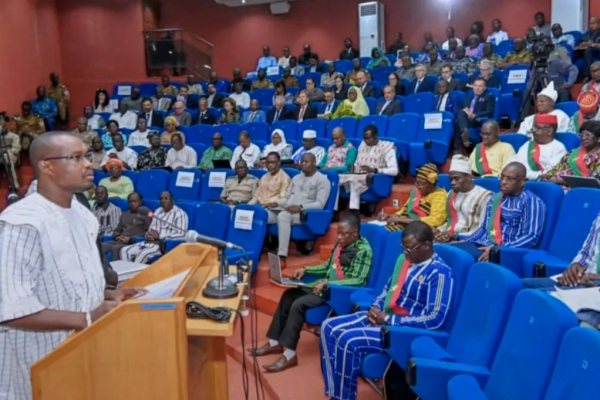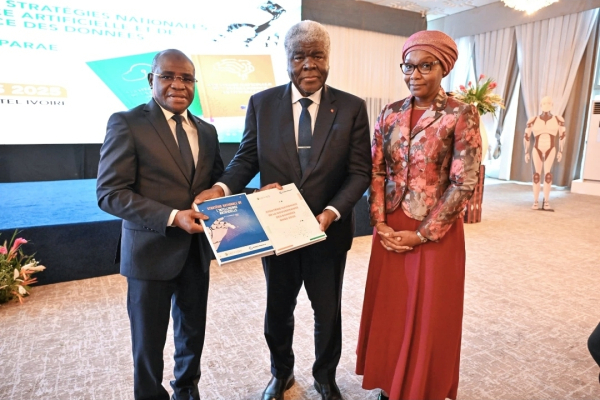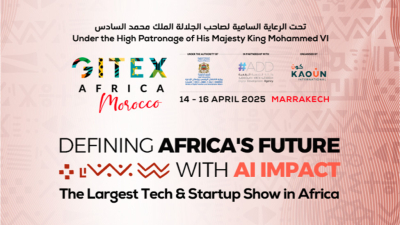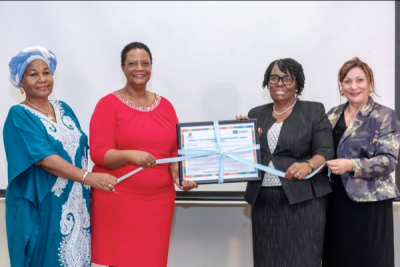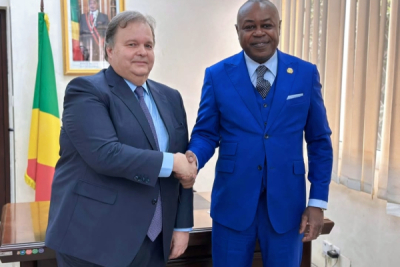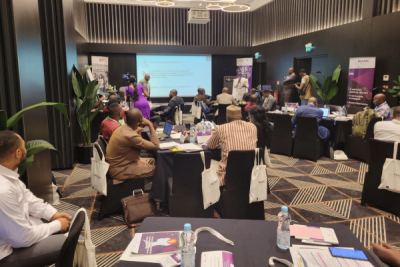Like many African countries, the Burkinabe government views digital technology as a key driver of socio-economic development. It is focusing on connecting public administrations to improve services for citizens.
The Burkinabe government has invested over 18 billion CFA francs ($30 million) in developing digital infrastructure, Prime Minister Rimtalba Jean Emmanuel Ouédraogo told the Transitional Legislative Assembly on Friday, March 14, citing significant progress in the telecommunications sector.
Ouédraogo said the state allocated more than 3 billion CFA francs to assist operators in restoring networks in areas previously destabilized by insecurity. This funding enabled the expansion of electronic communication networks to 44 new localities in underserved regions, improving internet and telecommunications service access.
On the administrative front, 104 new buildings were connected to the National Public Administration Information Network (RESINA), bringing the total number of interconnected public buildings to 2,947. To bolster digital sovereignty and strengthen national capacity, the government initiated the construction of two mini data centers, representing an investment exceeding 15 billion CFA francs.
Between 2023 and 2024, 169 administrative procedure platforms were digitized, with 77 currently operational and 92 in the deployment phase. These efforts are part of a broader strategy to position Burkina Faso as a key player in information and communication technology (ICT) integration in West Africa.
Despite these advances, Burkina Faso faces substantial challenges. According to the International Telecommunication Union’s (ITU) “Measuring Digital Development – ICT Development Index 2024,” published in June 2024, Burkina Faso ranks 43rd out of 47 African countries in ICT development, with a score of 30.1 out of 100.
Upon completion, these investments will significantly enhance Burkina Faso’s access to digital services and strengthen its technological autonomy. This, officials say, will establish a foundation for a more efficient and inclusive digital ecosystem, aligning with the nation’s modernization and socio-economic development goals.
By Samira Njoya,
Editing by Sèna D. B. de Sodji
AI presents Africa with a major opportunity to overcome its development challenges through innovative solutions. Countries like Côte d'Ivoire, among the most forward-thinking, are implementing strategic initiatives to leverage this emerging technology.
Côte d'Ivoire presented its national strategy for artificial intelligence (AI) and data governance on Thursday, March 13. After eight months of preparation, the document was officially handed over to Prime Minister Beugré Mambé (photo, center) for government adoption and its upcoming launch. This initiative marks a turning point in the country’s digital policy.
"This launch marks an important milestone in our dynamic and conscientious approach to Côte d’Ivoire’s digital transformation in the era of the Fourth Industrial Revolution, characterized by emerging technologies such as artificial intelligence," said Robert Beugré Mambé.
Fundamental Pillars and an Ambitious Five-Year Action Plan
Côte d'Ivoire’s National Artificial Intelligence Strategy is built on three fundamental pillars. The first focuses on investment in skills and infrastructure, particularly through the construction of data centers and sovereign cloud systems to host and secure local data. The second pillar is regional and social inclusion, ensuring that all cities and social groups benefit from digital transformation. The third pillar addresses governance, aiming to establish a legal and ethical framework for AI development to ensure optimal and responsible growth conditions.
The implementation of the National AI Strategy will span five years. Among the initial actions is the creation of a National Committee for AI and Data Governance, tasked with overseeing concrete projects to assess AI’s impact on key sectors such as agriculture, health, and education. Another major initiative is the establishment of an AI hub, which will include a startup incubator and a specialized training center.
A key element of this strategy is the introduction of a "Safe AI" label, designed to establish a legal and ethical framework for AI solutions in Côte d'Ivoire. Additionally, a mapping of AI resources in the country, covering both infrastructure and expertise, will be developed to monitor sectoral progress.
Data Governance: A Complementary Pillar
Data governance is an essential complementary component of the strategy, with a focus on several key areas, including data culture, ethics, security, and system interoperability. The creation of data centers and the strengthening of national connectivity are central to this strategy, ensuring effective and secure data management. The objective is to enhance the value of data while guaranteeing a secure framework for its use.
Through this dual strategy, Côte d'Ivoire aims to become a model for inclusive, ethical, and responsible AI, accelerating its digital transformation to build a united and prosperous nation by 2030. Although the investment amount required for implementation has not yet been disclosed, it is clear that the country is committed to investing in this emerging technology to drive development.
Once implemented, Côte d'Ivoire will join the select group of African countries that have launched a national AI strategy, including Benin, Egypt, and Morocco, as well as other nations such as Rwanda, Senegal, and Nigeria, which have already announced preparations for AI adoption.
By Samira Njoya,
Editing by Sèna D. B. de Sodji
The 3rd edition of the Gulf Information Technology Exhibition (GITEX) AFRICA 2025 will take place from April 14–16 in Marrakech. The event will unite global tech leaders, policymakers, and investors to shape Africa’s digital transformation.
GITEX AFRICA is a hub for innovation and investment. The event will feature 500+ tech and startup companies, 660+ expert speakers, and 350+ investors managing $200+ billion in assets.
Key sectors include AI, cloud, IoT, fintech, telecom, digital cities, agritech, climate tech, health tech, cybersecurity, and edutech. Over three days, industry pioneers will collaborate and drive Africa’s tech growth, cementing its place in the global digital economy.
UNESCO has already supported the digitization of education in several African countries since 2015 through this program. These include Côte d'Ivoire, Senegal, and Ghana.
The Namibian government has partnered with the United Nations Educational, Scientific and Cultural Organization (UNESCO) to integrate digital technologies into the national education system, officials announced Wednesday.
The initiative, launched March 12, is part of the third phase of the "ICT Transforming Education in Africa – Phase III" program, initiated in 2015 by UNESCO in partnership with the Korean Funds-in-Trust (KFIT). The program aims to leverage information and communication technologies (ICT) for educational development in sub-Saharan Africa.
In Namibia, the National Institute for Educational Development (NIED) will implement the project. It includes the creation of a national digital platform with curriculum-aligned content, digital skills training for teachers and learners, and the development of a comprehensive policy on ICT use in education.
The Namibian government considers ICT a key driver for transforming education, as outlined in the 2023-2030 charter project stemming from the 2022 National Education Conference. A needs assessment conducted between June and August 2024 identified challenges including access to digital learning resources, teachers’ digital skills, and the regulatory framework governing ICT use in schools.
"[...]The dynamic nature of technology necessitates continuous adaptation and innovation. If we are to fully harness the potential of ICT fully for enhanced teaching and learning, we must build upon our achievements and address the existing gaps. This project presents us with a remarkable opportunity to further our efforts in the digital transformation of education," said Anna Nghipondoka, Minister of Education, Arts, and Culture.
The digitization of education depends on widespread internet access in schools and homes. According to the International Telecommunication Union (ITU), 62.2% of Namibia’s estimated 2.9 million population has internet access, and 63.2% of households are connected. However, the household figure may include households where only one member has a subscription, including mobile access.
By Isaac K. Kassouwi,
Editing by Sèna D. B. de Sodji
The Republic of Congo is working to create a more digitally advanced society. This requires modernizing essential sectors, particularly telecommunications. To this end, the country is strengthening partnerships to gain access to advanced technologies and expertise.
Congo's Minister of Posts, Telecommunications, and the Digital Economy, Léon Juste Ibombo, met with Turkish Ambassador to Congo, Hilmi Ege Türemen, on Thursday to explore expanded cooperation in postal services, telecommunications, and the digital economy.
"We discussed ways of cooperation in the postal sector, where an agreement is already under negotiation. Turkey has quickly adapted to these negotiations to finalize this agreement within a very short timeframe. Cooperation with Turkey represents a major opportunity for our country to access cutting-edge expertise and technologies in the digital sector," Ibombo said following the meeting.
The meeting is part of ongoing efforts to strengthen bilateral relations between the two countries, following recent exchanges between Congolese President Denis Sassou N'Guesso and Turkish President Recep Tayyip Erdoğan.
Both nations agreed to focus future collaboration on modernizing the postal sector, enhancing technical and human capacities, and cooperating on emerging technologies. The Turkish ambassador also expressed his country's interest in hosting Congolese trainees in the telecommunications sector and facilitating technology transfer.
If the two countries finalize agreements, they are expected to accelerate Congo's digital transformation by improving access to modern infrastructure and technological solutions tailored to the country's challenges.
Turkey, which has made significant advancements in the digital sector, has heavily invested in e-commerce and postal service development.
In 2022, online transactions in Turkey reached approximately 800 billion Turkish lira ($21.86 billion), a 488% increase compared to 2019. This growth is attributed to high internet penetration. According to Datareportal, at the beginning of this year, 88.3% of Turkey's population used the internet, while 92.1% were connected via mobile devices.
Turkey ranks 27th globally in digital governance, according to the United Nations index, with a score of 0.8913 out of 1, reflecting advanced e-government services. The country also possesses expertise in cybersecurity and artificial intelligence, fields in which it is prepared to share knowledge with Congo.
Samira Njoya
To accelerate its digital transformation, the Cameroonian government is actively seeking investment. A key initiative is the Digital Transformation Acceleration Project, launched in 2023 and supported by a $100 million World Bank grant.
The European Union has invested 1.93 million euros ($2.09 million) in 12 micro-projects in Cameroon over four years through the Promotion of Research, Innovation, and Digital Culture in Central Africa (PRICNAC) project, officials said during a workshop this week.
The project’s capitalization workshop, held in Douala from March 10 to 14, 2025, aimed to evaluate the initiative and develop a sustainability plan for future similar projects, according to Investir au Cameroun.
"This initiative aims to evaluate the project both quantitatively and qualitatively in order to develop a sustainability plan that will allow similar initiatives to endure," said Alain Kiyindou, Regional Director of the Agence Universitaire de la Francophonie (AUF) for Central Africa and the Great Lakes.
PRICNAC, which ran from January 2021 to January 2025, has an overall budget of approximately 5 million euros for 17 mini-projects across eight Central African countries. The project is funded 15% by the Organization of African, Caribbean, and Pacific States (OACPS) and 85% by the EU through the ACP Innovation Fund and its research and innovation program.
The project aims to strengthen research and innovation capacities in Central African countries, consolidate innovation ecosystems, and create synergies between entrepreneurship, digital technology, and innovation policies to promote sustainable development and reduce poverty.
Cameroon accounted for 70% of PRICNAC’s 17 mini-projects and absorbed 60.48% of its budget.
Among the funded projects is Synerime, led by Cameroonian engineer Flavien Kouatcha, which aims to create employment opportunities for young people by fostering collaboration between research ecosystems, innovation, and businesses.
Funded with 150,000 euros, Synerime was implemented in Congo, Cameroon, and Gabon. "We have trained young entrepreneurs and student innovators on how to register a patent, propose solutions to businesses, and draft contracts with private companies so that these companies can adopt their solutions," Kouatcha said.
Frédéric Nonos
Agriculture is a cornerstone of Senegal's economy and a primary source of income for much of the rural population. To tackle issues of efficiency and transparency in agricultural subsidy management, the country is implementing digital solutions.
Senegal's government is partnering with the International Finance Corporation (IFC), the World Bank's private sector arm, to digitize agricultural subsidies, the organizations announced Tuesday.
The initiative, led by the Ministry of Agriculture, Food Sovereignty, and Livestock, aims to improve transparency and efficiency in distributing aid to key sectors, including peanuts, maize, cowpeas, and rice.
The project, approved July 29 with a budget of $500,000, will leverage IFC's technical assistance to design and implement a digitization plan, working alongside the ministry and its partners. The goal is to better structure the distribution of agricultural inputs, ensuring more efficient and transparent subsidy management.
Digitizing payments is seen as crucial to ensuring rapid and traceable subsidy distribution, providing direct support to farmers and boosting productivity in strategic sectors, officials said. This aligns with Senegal's food sovereignty objectives.
In Africa, small-scale farmers produce more than 70% of the food supply and support millions of rural households, according to the African Development Bank. However, these farmers face significant challenges, including limited access to affordable inputs, insufficient financing, scarce advisory services, and market information gaps.
The digitization initiative is expected to transform Senegal's agricultural sector, facilitating the swift distribution of subsidies in line with crop calendars and improving the livelihoods of smallholder farmers.
By Samira Njoya,
Editing by Sèna D. B. de Sodji
Google is providing Conference Scholarships to help African students in technology and business attend top computer science conferences globally. The initiative aims to remove financial barriers, foster networking, and connect students with industry leaders.
Applicants must be full-time students at an African university, demonstrate financial need, and have an accepted research paper at a top computer science conference.
Scholarships cover travel and registration fees, with applications reviewed year-round. Approved funds are disbursed through the student’s university.
Safaricom Talent Cloud is offering a six-week Capstone Project for tech professionals to build, launch, and showcase products with expert mentorship and peer collaboration.
The program is open to those skilled in UX/UI design, backend (Java/Node.js), frontend (React.js), mobile (Kotlin/Flutter), DevOps, and Scrum Master/Product Owner roles.
Held in Addis Ababa, participants must attend in person for two hours weekly. The program offers a chance to apply skills, gain industry insights, and make an impact.
South Africa will host the second edition of The Presidential African Youth in AI and Robotics Competition 2025, which is set to position Africa as a leader in the Fourth Industrial Revolution (4IR).
The competition is organized by AUDA-NEPAD, Ele-vate AI Africa, and the South African Government to foster innovation, skills development, and AI-driven solutions tailored to African needs. The 2025 edition will feature 12 categories, with the Presidential Award as the highest honor.
African youth aged 15 to 35 years can participate as individuals or in teams. The competition is open for registration and submissions must be completed by June 13, 2025. The final ceremony will take place on November 22-23, 2025.
More...
As Africa enters the digital era, its skilled workforce in this field remains limited across several segments. While various public initiatives aim to address this issue, they often face budgetary constraints, creating an opportunity for the private sector.
Congolese authorities received Thione Niang, a Senegalese artificial intelligence expert and promoter of the Give1Project digital skills training program, on Monday, March 10, as part of a delegation led by Adama-Dian Barri, United Nations Development Programme (UNDP) Resident Representative in Congo.
The visit aimed to integrate Congo into the Give1Project, which seeks to train 25,000 young Africans in digital skills, particularly cybersecurity and artificial intelligence. The initiative is supported by the UNDP, Microsoft, and France, among others.
"Increasingly, the world will be connected, and more and more, we will move towards digitalization," said Léon Juste Ibombo, Congo’s Minister of Posts, Telecommunications, and the Digital Economy. "Administrative procedures will be simplified. The state will benefit from optimized resources since we will no longer use the means we had before, and this is an extraordinary advancement. We need to strengthen capacities and train young people so they can take ownership of these digital infrastructures."
The initiative aligns with Congo’s national digital transformation strategy, Vision Congo Digital 2025, and the World Bank-funded $100 million digital transformation acceleration project. Local authorities aim to enhance the population's digital skills, and the Give1Project supports this objective. The African Center for Research in Artificial Intelligence (CARIA) will be part of the collaboration.
According to the United Nations, Congo had a Human Capital Index (HCI) score of 0.4637 out of 1 in 2024, a component of the e-Government Development Index. This indicator assesses citizens’ ability to use e-government services. Congo’s score is slightly above the African average of 0.4346 but below the global average of 0.6494.
By Adoni Conrad Quenum,
Editing by Feriol Bewa
The startup ecosystem is rapidly expanding worldwide. In Côte d'Ivoire, the government aims to leverage this momentum to foster the emergence of innovative startups and strengthen the digital economy.
The Ivorian government announced the creation of a Digital Startup Labeling Committee under the Ministry of Digital Transition and Digitalization, aiming to support young tech companies and strengthen the country's digital ecosystem, during the Council of Ministers on Wednesday, March 12.
According to a ministry statement, the Labeling Committee will evaluate and award a label to digital startups based on criteria including innovation, economic viability, and impact on the local economy. The committee will also oversee a digital platform to facilitate startups' access to services and support programs.
Labeled companies will be monitored and audited to ensure compliance with the label’s requirements. Additionally, the committee will propose regulatory adjustments to align the legal framework with sector advancements.
The committee is part of the Ivorian government's broader efforts to promote digital startups. According to Partech Africa, Ivorian startups raised $17 million in 2021, $33 million in 2022, $21 million in 2023, and $33 million in 2024. Despite this growth, startups face challenges including limited access to structured financing, market entry difficulties, and the lack of a clear regulatory framework.
By providing Ivorian startups with greater visibility and a structured environment, the initiative is expected to enhance their competitiveness. The long-term goal is to develop a robust digital economy that creates jobs and generates added value for Côte d'Ivoire.
By Samira Njoya,
Editing by Sèna D. B. de Sodji
Ahead of Uganda's 2021 elections, the government suspended all social media platforms, citing a need to control online misinformation. While access to most platforms has since been restored, Facebook remains blocked.
Facebook, suspended in Uganda since January 2021, could soon be restored, Information Technology and National Guidance Minister Chris Baryomunsi said Tuesday.
Baryomunsi, speaking at a "CEO-Consumer Forum" organized by the Uganda Communications Commission (UCC) in Kampala, said discussions with Meta, Facebook's parent company, are nearing completion.
He said that once an agreement is reached, there should be no further obstacles, provided Facebook refrains from engaging in local partisan politics and focuses solely on providing its services.
"The issue with Facebook arose during the last electoral period when Facebook took a partisan stance in our local politics," Baryomunsi said. "A platform like Facebook is not expected to take a partisan stance in our local politics. When they began deleting those who belong to the ruling party, and apparently supporting the opposition, this is not a lawless country."
Progress between the two parties had been limited until recently. In December 2022, President Yoweri Museveni said the government would restore Facebook access once it stopped "playing games." "Facebook are arrogant. They were being used to attack us. When our own people tried to answer back they shut us. It has been two years since Facebook was chased out of Uganda. When I checked, boda bodas and taxis were still moving [in absence of Facebook] ; even matooke and milk were still coming. I hope Facebook now knows who is in charge of Uganda!" he said.
Restoring Facebook access is expected to benefit individuals and businesses. In December 2023, a lawyer representing a group of small and medium-sized enterprises (SMEs) said the shutdown had cost local businesses $17.5 million. DataReportal figures show the number of social media users in Uganda dropped from 3.4 million in 2021 to 2.4 million in 2025.
The restoration is also expected to improve online security for Ugandans, as using virtual private networks (VPNs) to access the platform exposes them to cyberattack risks.
By Isaac K. Kassouwi,
Editing by Sèna D. B. de Sodji
A new cycle of transformation is underway in the African telecom market. Under growing pressure, only the most decisive operators with an ambitious vision will be able to seize the opportunity, paving the way for a new phase of growth.
Artificial intelligence (AI) is generating growing interest across various sectors in Africa. Google estimates that its adoption could contribute up to $1.5 trillion to the continent’s economy by 2030. In the telecommunications sector in particular, AI has the potential to act as a growth catalyst, a key tool for addressing numerous challenges, and a gateway to new opportunities. This comes at a time of profound market transformation, marked by increasing operational challenges (network maintenance costs, energy, marketing, and commercial services) and rapid technological changes.
Over the past fifteen years, the market has witnessed increased consolidation and multiple divestments, reflecting the strategic repositioning necessary for players facing fierce competition, margin pressures, and increasingly stringent regulations. In 2014, Etisalat reorganized its presence by selling its subsidiaries to Maroc Telecom. In 2016, Orange acquired Millicom’s (Tigo) subsidiary in the Democratic Republic of Congo, as well as Bharti Airtel’s subsidiaries in Burkina Faso and Sierra Leone, while withdrawing from Kenya. In 2021, the sale of its operations to the Ghanaian state marked Millicom’s complete exit from Africa. Several acquisitions, divestments, and bankruptcies have followed over the years, including Vodafone’s sale of its Ghanaian operations to Telecel Group in 2023 and MTN Group’s withdrawal from Guinea and Guinea-Bissau in 2024.
A Decisive Turning Point
Today, AI is seen by several telecom players in Africa as an opportunity to be fully leveraged. It promises greater efficiency and cost reduction. At the Northern Africa OTF event organized by Huawei during the Mobile World Congress 2025 in Barcelona, Spain, Bruce Xun, president of Huawei’s global technical service, identified AI as a major inflection point. According to him, AI will optimize operations, enhance decision-making, and create new sources of value, paving the way for innovative and high-performance telecom solutions in the digital age. This is why the Chinese technology company has been investing for several years in AI research and integration into its new services and infrastructures, particularly telecom towers that adjust their capacity based on network traffic.
Huawei is not the only company to recognize AI’s transformative potential. In an interview with CIO Mag in 2024, Jocelyn Karakula, chief technology innovation officer at Orange Middle East and Africa (OMEA), highlighted that the company had already adopted AI for various applications. “AI is a strategic priority for Orange, given its ability to accelerate value creation and enhance performance across multiple domains. In terms of networks, which are primarily mobile in Africa, we manage increasingly complex technologies (2G, 3G, 4G, and now 5G) in countries facing energy challenges. To ensure optimal network performance, AI provides additional capabilities that guarantee the quality of service and customer experience,” he explained.
A study published in 2024 by Nvidia reveals that nearly 90% of telecom companies worldwide use AI, with 48% in the pilot phase and 41% in active deployment.
A Wide Range of Applications
In several countries, notably Nigeria and South Africa, MTN Group has made AI a cornerstone of its customer service. Through the Zigi chatbot and virtual assistants, the company has reduced response times to customer inquiries and improved satisfaction levels. Vodacom, in collaboration with Nvidia, is developing a virtual network management platform that uses AI to facilitate decisions on network performance improvements. In Kenya, Safaricom has deployed Nokia’s AVA energy efficiency software, which utilizes AI and machine learning algorithms to automate the shutdown of inactive equipment during low-usage periods, thereby reducing energy consumption and costs.
Hicham Ennoure, executive vice president of Moov Money Gabon, recently revealed in Barcelona that the rapid modernization of the platform, combined with targeted marketing strategies based on data analysis, allowed the company to increase its user base by 84% and its revenue by 85% in 2024.
Operational Efficiency
Major strategy consulting firms are also optimistic about AI’s positive impact on telecoms. McKinsey cites the example of a European telecom operator that increased its marketing campaign conversion rates by 40% while reducing costs, thanks to AI-generated personalized content. Another example is a Latin American operator that improved customer service productivity by 25% and enhanced the quality of customer experience, with the potential to reduce costs by 15% to 20%.
“Our experience working with clients indicates the potential for telcos to achieve significant EBITDA impact with gen AI. In some cases, estimates indicate returns on incremental margins increasing 3 to 4 percentage points in two years, and as much as 8 to 10 percentage points in five years, by enhancing customer revenue through improved customer life cycle management and decisively reducing costs across all domains,” writes McKinsey.
Challenges to Overcome
While AI offers considerable opportunities, its adoption in Africa is not without obstacles. IBM indicates that integrating any new technology requires investment. Modern AI investments are costly, even though they promise long-term profitability. However, not all operators have the financial capacity to undergo this transformation.
The American firm also notes that AI adoption fundamentally transforms businesses, requiring many employees—if not all—to acquire new skills to integrate AI tools into their work. Yet, Africa still faces a shortage of specialists in advanced technologies. Moreover, ethical and regulatory issues related to AI usage, particularly regarding data protection and privacy, require special attention.
To overcome these challenges, the GSMA recommends close collaboration between governments, operators, and technology players. Public authorities must establish policies that encourage AI-driven innovation and investment while ensuring a balanced regulatory framework. Meanwhile, operators must invest in training and developing local talent to maximize the benefits of this technology.
Muriel EDJO


